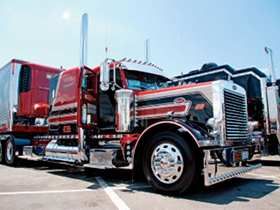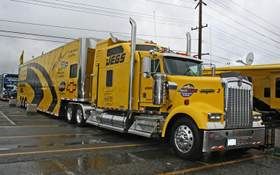Need The Truth On Celadon Quality Driving School . Any Truth Will Help Guide And Build My Confidence.
Topic 3369 | Page 3

The way I was explained on how miles are calculated is that PC Miler decides the shortest practical truck route, calculates those miles, then they assign you fuel stops at locations that are in their best interest. The miles you are paid are from post office to post office via shortest practical truck route. This is practical miles. If you want hub miles (aka all the miles the truck turns), you'll need to find a company that offers that. No bigger companies that I have researched pay hub miles. The smaller ones that DO pay hub miles pay at a lower rate than the practical mile companies.
If your hub miles are 100 or more over what you are paid and you followed the route given to you, contact your DM who will make an adjustment based on the miles you drove minus 100 minus the assignment's miles. Example: I am assigned a load that pays 1200 but I drove 1440. They'll subtract 100 miles from the 1440, and subtract the assignment's miles (1200) leaving a result of 140, which is what they'll submit for you to get paid.
I hate it. I disagree with it. In all fairness if I am forced to detour because of emergency construction or whatever else (like the 50 mile detour in denver a couple weeks ago because of some bike race) I want to be paid, but to be frank, the company's policy on it doesn't care.
BMI:
Body mass index (BMI)
BMI is a formula that uses weight and height to estimate body fat. For most people, BMI provides a reasonable estimate of body fat. The BMI's biggest weakness is that it doesn't consider individual factors such as bone or muscle mass. BMI may:
- Underestimate body fat for older adults or other people with low muscle mass
- Overestimate body fat for people who are very muscular and physically fit
It's quite common, especially for men, to fall into the "overweight" category if you happen to be stronger than average. If you're pretty strong but in good shape then pay no attention.
Dm:
Dispatcher, Fleet Manager, Driver Manager
The primary person a driver communicates with at his/her company. A dispatcher can play many roles, depending on the company's structure. Dispatchers may assign freight, file requests for home time, relay messages between the driver and management, inform customer service of any delays, change appointment times, and report information to the load planners.HOS:
Hours Of Service
HOS refers to the logbook hours of service regulations.
The way I was explained on how miles are calculated is that PC Miler decides the shortest practical truck route, calculates those miles, then they assign you fuel stops at locations that are in their best interest. The miles you are paid are from post office to post office via shortest practical truck route. This is practical miles. If you want hub miles (aka all the miles the truck turns), you'll need to find a company that offers that. No bigger companies that I have researched pay hub miles. The smaller ones that DO pay hub miles pay at a lower rate than the practical mile companies.
If your hub miles are 100 or more over what you are paid and you followed the route given to you, contact your DM who will make an adjustment based on the miles you drove minus 100 minus the assignment's miles. Example: I am assigned a load that pays 1200 but I drove 1440. They'll subtract 100 miles from the 1440, and subtract the assignment's miles (1200) leaving a result of 140, which is what they'll submit for you to get paid.
I hate it. I disagree with it. In all fairness if I am forced to detour because of emergency construction or whatever else (like the 50 mile detour in denver a couple weeks ago because of some bike race) I want to be paid, but to be frank, the company's policy on it doesn't care.
Hmmm... seems like something they should make a rule on and pay the hub miles... but at that point people would take the longest route possible...
BMI:
Body mass index (BMI)
BMI is a formula that uses weight and height to estimate body fat. For most people, BMI provides a reasonable estimate of body fat. The BMI's biggest weakness is that it doesn't consider individual factors such as bone or muscle mass. BMI may:
- Underestimate body fat for older adults or other people with low muscle mass
- Overestimate body fat for people who are very muscular and physically fit
It's quite common, especially for men, to fall into the "overweight" category if you happen to be stronger than average. If you're pretty strong but in good shape then pay no attention.
Dm:
Dispatcher, Fleet Manager, Driver Manager
The primary person a driver communicates with at his/her company. A dispatcher can play many roles, depending on the company's structure. Dispatchers may assign freight, file requests for home time, relay messages between the driver and management, inform customer service of any delays, change appointment times, and report information to the load planners.HOS:
Hours Of Service
HOS refers to the logbook hours of service regulations.This is something that causes many rookies to stumble. I never really worry about it. There will be times if you are savvy, that you will beat the system.
I've always looked at the paid miles as a contract between me and the employer. Every time they send me a load they tell me how many miles it pays. They are not telling you how many miles you will drive. One of the negotiating tactics in logistics companies is that they will negotiate the amount of miles they charge the customer rather than the rate. It may seem like splitting hairs to you, but it is one way for them to maintain a decent rate for their services. Some drivers feel they are being cheated, but I've always come real close to having everything average out pretty fairly when you look back over a month or two of work.

This is something that causes many rookies to stumble. I never really worry about it. There will be times if you are savvy, that you will beat the system.
I've always looked at the paid miles as a contract between me and the employer. Every time they send me a load they tell me how many miles it pays. They are not telling you how many miles you will drive. One of the negotiating tactics in logistics companies is that they will negotiate the amount of miles they charge the customer rather than the rate. It may seem like splitting hairs to you, but it is one way for them to maintain a decent rate for their services. Some drivers feel they are being cheated, but I've always come real close to having everything average out pretty fairly when you look back over a month or two of work.
From talking to drivers from different companies and talking to recruiters themselves. It seems to me that there are three basic systems out here that companies use.
The smaller, more family orientated companies pay actual miles. They only have a few drivers. Each one is known by their first names as the saying goes. They pay what miles the truck is actually driven.
The next system both medium and large companies use. Practical miles. Those are the actual routing miles that the company routes you on. Address to address and any out of route miles.
Then there is the third system. Any company can use this. The shortest truck route possible from the edge of of one city to the edge of another city.
That is the one where the driver gets cheated. Yes cheated.
I don't get many trips where I have to make more than on stop on a single trip. But it happens once in a while. The reason I know I am not paid for miles driving in the same city. It has happened to me more than once.
For example, one load I had I dropped on one side of town. Went across town to swap trailers for another load, 27 miles. And I was not paid for those miles. That happens on a regular basis if we have a terminal in the same town our load drops.
Old School my friend. You said it is like a contract. I understand what you are saying, but in an actual contract, both sides have a say so in the wording and how the contract is written. And what is acceptable. Company drivers don't have that option.
I don't know how Western does it, but at Celadon, I, as a company driver have no say so what so ever. I am sent a load. Told I can't refuse it. And they pay the miles they say they are going to pay.
I have kept note pads with every load I have ever been assigned. Even the ones that I couldn't do and was unassigned from. There is an old saying. Paperwork, paperwork, paperwork. If you don't have the paperwork it didn't happen.
So I have everything since I started. I took a two month time period this past winter when it was slow. I don't see it averaging out. Sorry my friend.
When I was training, both my trainers told me. When I receive a load and start figuring miles. Take 10% off right off the top of the actual miles. Sometimes they short you 8% sometimes 12%. But on average, use 10%. That way you won't be disappointed when you see you paycheck differ from the actual miles you drive.
It seems to me that if they can figure how many miles it is from Post Office to Post Office, they could figure out to the address.
No company could pay actual miles. There would be enough drivers out here to cheat the company enough the company would be out of business.
But also, the companies could be a bit more fair. Pay from address to address. And if they send you out of route for fuel, or to avoid tolls, just pay the extra miles. Stop cheating the drivers.
And if you don't see it as cheating the drivers. When you worked an hourly paying job, did you ever work off the clock because your boss told you to?
And you can look at it how ever you want. You can say it is different till the cows come home. You are just fooling yourself. Getting paid to do a job, no matter how or in what form is still getting paid to do a job. The only difference in trucking, we are at the mercy of what the company "allows".
Even the FMCSA says that the system most companies use is unfair. They have pushed for hourly pay or some kind of a split system for years. While the system is unfair, it is not illegal. Yet.
Keep it safe out here. The life you save might be your own. Joe S.
Terminal:
A facility where trucking companies operate out of, or their "home base" if you will. A lot of major companies have multiple terminals around the country which usually consist of the main office building, a drop lot for trailers, and sometimes a repair shop and wash facilities.
CSA:
Compliance, Safety, Accountability (CSA)
The CSA is a Federal Motor Carrier Safety Administration (FMCSA) initiative to improve large truck and bus safety and ultimately reduce crashes, injuries, and fatalities that are related to commercial motor vehicle
FMCSA:
Federal Motor Carrier Safety Administration
The FMCSA was established within the Department of Transportation on January 1, 2000. Their primary mission is to prevent commercial motor vehicle-related fatalities and injuries.
What Does The FMCSA Do?
- Commercial Drivers' Licenses
- Data and Analysis
- Regulatory Compliance and Enforcement
- Research and Technology
- Safety Assistance
- Support and Information Sharing
SAP:
Substance Abuse Professional
The Substance Abuse Professional (SAP) is a person who evaluates employees who have violated a DOT drug and alcohol program regulation and makes recommendations concerning education, treatment, follow-up testing, and aftercare.
Fm:
Dispatcher, Fleet Manager, Driver Manager
The primary person a driver communicates with at his/her company. A dispatcher can play many roles, depending on the company's structure. Dispatchers may assign freight, file requests for home time, relay messages between the driver and management, inform customer service of any delays, change appointment times, and report information to the load planners.HOS:
Hours Of Service
HOS refers to the logbook hours of service regulations.Joe, I sometimes forget how I was blessed with a really great dispatcher from the start. I once had a load that I had to re-power in Houston TX that also delivered in another part of Houston. I drove a little more than forty miles, but the load assignment had only one mile on it. I remember thinking that stinks, but I'll do it and move on to the next job. I kind of forgot about it until I got my paycheck. My dispatcher put 175 dollars breakdown pay on that job just because he appreciated me helping him out without moaning and groaning about it. Unfortunately he's no longer my dispatcher, but he sure made life good for me my first year.
Dispatcher:
Dispatcher, Fleet Manager, Driver Manager
The primary person a driver communicates with at his/her company. A dispatcher can play many roles, depending on the company's structure. Dispatchers may assign freight, file requests for home time, relay messages between the driver and management, inform customer service of any delays, change appointment times, and report information to the load planners.
Joe, I sometimes forget how I was blessed with a really great dispatcher from the start. I once had a load that I had to re-power in Houston TX that also delivered in another part of Houston. I drove a little more than forty miles, but the load assignment had only one mile on it. I remember thinking that stinks, but I'll do it and move on to the next job. I kind of forgot about it until I got my paycheck. My dispatcher put 175 dollars breakdown pay on that job just because he appreciated me helping him out without moaning and groaning about it. Unfortunately he's no longer my dispatcher, but he sure made life good for me my first year.
i have watched TOO MANY trucker vlogs on youtube trying to learn things before i go to school just to have some info before starting along with the High Road stuff here, and almost all of them say they have good dispatchers, or that they have only ever had 1 bad dispatcher and got it changed.
The more research i do the more i find that most of the crap on the internet is just crap... Its any people venting and want everyone else to hate something.
Dispatcher:
Dispatcher, Fleet Manager, Driver Manager
The primary person a driver communicates with at his/her company. A dispatcher can play many roles, depending on the company's structure. Dispatchers may assign freight, file requests for home time, relay messages between the driver and management, inform customer service of any delays, change appointment times, and report information to the load planners.
Re Run, I was looking at the same exact choices when I was deciding on who to go with. After hearing a lot of justified or not bad press about a couple of the other companies many start with, I narrowed it down to Celadon and Knight. My first choice between the two was Knight, for three reasons: I just got a CL permit and was a leg up, wasn't crazy about having to team, and I like the fact they pay you during your initial training. Celadon was such a close second, I guess I shoulda called them the "first and a half choice": training seems to be the best (IMHO) of any I've seen, mentor time is in two-week intervals, maybe a little better equipment. There are advantages and disadvantages of one over the other, but the final tally is that they're close and both good companies, better than a lot out there. The main thing is, go with someone you can feel good about, keep a good attitude, and get your first year's experience-- then you can do whatever you want.
Oh, yeah, if you're wondering who I chose, I went with Celadon-- gonna start class bright and early Monday morning, Oct. 13.
HOS:
Hours Of Service
HOS refers to the logbook hours of service regulations.
Quality Drivers is independent from Celadon. It is a school.
The tuition is about $7200.
You can choose if you want to work with Celadon or pay the tuition.
If you go with Celadon, you first need to pass the orientation, then you go over the road with a mentor, then you fulfil the commitment by running team.
Here you have two options:
1. You go 120000 miles with the pay of $0.15 per mile.
2. You go 240000 miles with $0.18 per mile.
Over The Road:
Over The Road
OTR driving normally means you'll be hauling freight to various customers throughout your company's hauling region. It often entails being gone from home for two to three weeks at a time.
OOS:
When a violation by either a driver or company is confirmed, an out-of-service order removes either the driver or the vehicle from the roadway until the violation is corrected.

A lot of useful information on this post. Here's my 2 cents. Celadon is a great company to start out with no experience. Contrary to what others may think the lease options is good if don't want to stay with them for the long haul. The lease options works best because you can get most of their money. In the 9 months you will make a lot of mistakes but the experience you gain is invaluable. With the lease option you can get up to .90 cpm and you have flexibility, which you will need in this business. As a new company driver the pay is less than .20 cpm and for someone who's not staying long, meaning up to 9 months it's awesome for you to consider the lease option. Bottom line lease option is way better than company driving if you stay less than a yr.
CPM:
Cents Per Mile
Drivers are often paid by the mile and it's given in cents per mile, or cpm.
New Reply:
New! Check out our help videos for a better understanding of our forum features

















Preview:
This topic has the following tags:
Advice For New Truck Drivers Choosing A Trucking Company Company Sponsored CDL Training Leasing A Truck On The Road In Training Team Driving







 TT On Facebook
TT On Facebook
i read that Swift a few years back was sued by the o/o and l/o for that, how is that legal?
SAP:
Substance Abuse Professional
The Substance Abuse Professional (SAP) is a person who evaluates employees who have violated a DOT drug and alcohol program regulation and makes recommendations concerning education, treatment, follow-up testing, and aftercare.